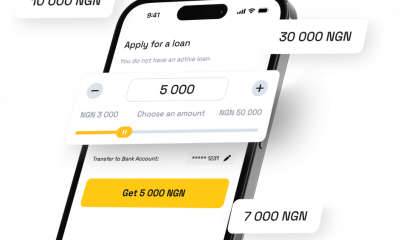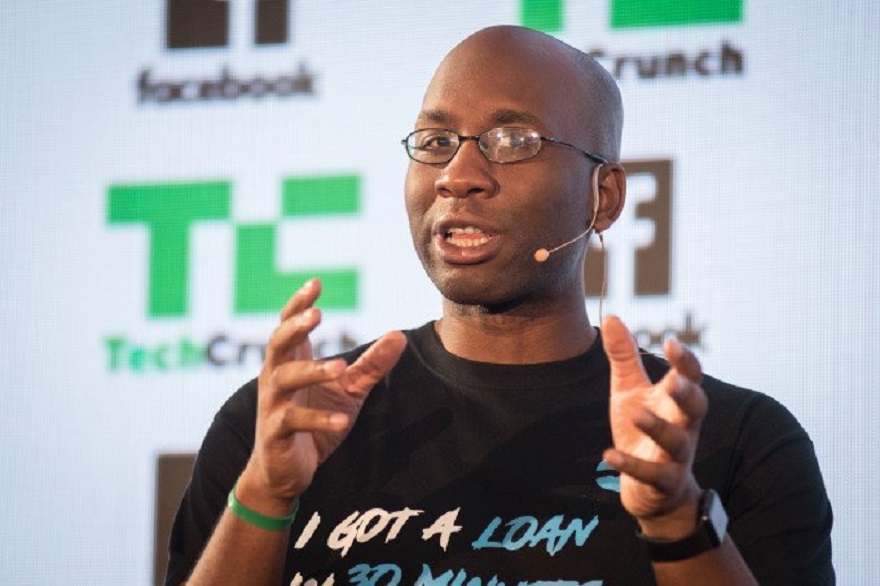Brands/Products
Carbon Grows Revenue by 68.8% to N6.3bn

By Adedapo Adesanya
Top Nigerian digital financial platform, Carbon, has revealed that its revenue for the year 2019 grew by 68.8 percent to N6.3 billion from N3.73 billion that it published in the preceding 2018.
This was contained in its recently released 2019 financial statements, where the firm also said the increase was as a result of its loan disbursement, which rose by 76.9 percent to N23.1 billion from N13 billion disbursed in 2018.
Carbon noted that its high growth was driven by its expansion into East African market of Kenya, adding that the added exposure gave it access to more Africans.
In 2019, Carbon noted that it disbursed over 975,000 loans which also saw improvement as it rolled out a loan top-up feature that allowed customers with active loans to access additional credit when needed. This boosted its revenue as it recorded over 25,000 loans top-up.
The expenses incurred by Carbon also increased last year by 60.9 percent from N3.5 billion in 2018 to over N5.6 billion.
The huge cost reported by the company affected its profit after tax, which went down by 23.7 percent to N112.6 million in 2019 as against the N147.2 million achieved in 2018.
To help customers make money, the firm introduced a one-time investment feature that allowed users to create an investment plan with as low as N100. At the end of 2019, Carbon users had invested a total of N2.8 billion.
Carbon, in addition, gave customers free bill payments along with cheaper transfers and fast transaction, more customers used the Carbon app for their payment services. This resulted in the number of transaction on the app increasing 23 times more than that of 2018. In total, 5.5 million bill payments worth about N51 billion were processed using Carbon
The company noted that the COVID-19 pandemic has led the company to reschedule loans for customers who have problems with repayments due to financial difficulties. It also added that it has been helping customers with about N20,000 in health benefits.
Carbon also announced its Disrupt Fund, a $100,000 Pan-African fund to address the lack of capital for African tech startups.
This year it is also making plans to introduce virtual and physical debit cards as well as a reward program for loyal customers and SME accounts for entrepreneurs.
Brands/Products
Hair Loss Treatments for Thicker, Fuller, Healthy Hair

Hair loss treatments for thicker, fuller, healthy hair are sought by millions who want to restore confidence and improve hair density. Whether thinning stems from genetics, stress, nutrition, or styling damage, a layered approach, combining medical therapies, topical products, lifestyle changes, and smart styling, typically delivers the best results. Happy Head products demonstrate how combining effective formulations with evidence-based routines can support measurable improvements. This guide walks through the common causes of hair thinning, evidence-based medical options, over-the-counter products that actually help, nutritional strategies, and practical haircare routines. It’s written to help a busy professional quickly separate hype from high-value actions and choose the right path forward.
Understanding Hair Thinning And Its Causes
Common Patterns And Medical Causes
Recognizing the pattern of hair loss is the first diagnostic step. Male-pattern and female-pattern hair loss (androgenetic alopecia) produce predictable thinning, receding hairlines and vertex thinning in men: diffuse crown thinning in women. Other medical causes include autoimmune conditions like alopecia areata, thyroid dysfunction, scalp infections, and medication side effects. A clinician will look for family history, onset speed, and signs such as scalp inflammation or scarring.
Telogen Effluvium, Nutritional Deficiencies, And Styling Damage
Telogen effluvium is a common reversible cause where more hairs enter the resting (telogen) phase after triggers like severe illness, childbirth, surgery, or abrupt dieting. Nutritional deficits, iron deficiency, low vitamin D, inadequate protein, or zinc shortfalls, can shrink hair shafts and slow growth. Finally, mechanical and chemical damage (tight hairstyles, frequent bleaching, thermal overuse) weakens hair and increases breakage, creating the appearance of thinning even when follicles remain viable.
Understanding the root cause matters because treatments differ: hormone-modulating therapies for androgenetic alopecia, nutrient repletion for deficiency, and habit changes for styling damage. A targeted approach avoids wasting time and money on mismatched solutions.
Clinically Proven Medical Treatments
Topical Minoxidil: Usage, Strengths, And Expectations
Topical minoxidil is the most accessible, evidence-backed treatment for many forms of thinning. Available in 2% and 5% formulations (and foams and solutions), it lengthens the anagen (growth) phase and can thicken miniaturized follicles. Users should expect 3–6 months before visible change and up to a year for maximum effect. Side effects are usually mild, scalp irritation or unwanted facial hair in rare cases. Importantly, stopping minoxidil typically leads to return to baseline within months.
Oral Medications And Hormone Therapies
Finasteride and dutasteride inhibit DHT and are effective for male-pattern hair loss: they require prescription and monitoring for side effects. In women, oral anti-androgens (spironolactone, cyproterone acetate where available) and combined oral contraceptives can help when androgens drive thinning. Thyroid replacement and treating systemic conditions also restore hair when an underlying disease is identified.
Low-Level Laser Therapy And Platelet-Rich Plasma (PRP)
Low-level laser therapy (LLLT) devices, helmets and combs, stimulate cellular activity and have modest but consistent evidence for increasing hair density when used regularly. PRP, an in-office procedure where a patient’s concentrated platelets are injected into the scalp, shows promising results in controlled studies, often used alongside minoxidil or finasteride. Both options are adjunctive, not miracle cures.
Hair Transplant Surgery: Who It’s For And What To Expect
Follicular unit extraction (FUE) and follicular unit transplantation (FUT) relocate robust donor follicles to thinning areas. Transplants are best for stable, patterned hair loss with adequate donor supply. Expect a multi-stage process: consultation, harvesting, implantation, and months of regrowth. Results are permanent for transplanted follicles, but continued treatment may be needed to protect native hair. Cost, recovery, and surgeon skill are critical variables, select a board-certified specialist with a strong portfolio.
Nonprescription Products That Can Improve Volume
Thickening Shampoos, Conditioners, And Scalp Serums
Volumizing shampoos and conditioners add temporary body by coating hair shafts and lifting roots. Look for sulfate-free formulas if the scalp is sensitive. Scalp serums aimed at improving scalp health, hydration, barrier repair, and mild exfoliation, can create a better environment for hair growth when used consistently.
Peptides, Botanicals, And Other Active Ingredients To Look For
Topical products that include peptides, caffeine, saw palmetto extract, and nicotinamide have varying levels of supportive evidence. Peptides may signal follicles to strengthen, while botanical DHT inhibitors like saw palmetto show modest benefit in some studies. Ingredients such as niacinamide, panthenol, and hyaluronic acid support hair appearance and scalp moisture: they’re low-risk and can complement proven medical therapies.
Cosmetic Solutions: Concealers, Fibers, And Styling Sprays
For immediate visual impact, cosmetic tools are effective: colored fibers adhere to hairs and scalp, scalp-concealing powders mask contrast, and root-lifting sprays boost volume. These are ideal when results are needed quickly (product launches, client meetings) and are a low-cost bridge while medical treatments take effect.
Lifestyle, Nutrition, And Supplements For Stronger Hair
Dietary Patterns And Key Nutrients (Protein, Iron, Zinc, Biotin, Vitamin D)
A balanced diet supports hair growth. Hair is protein-rich, so adequate dietary protein is foundational. Iron deficiency is a common, reversible contributor to shedding, ferritin testing is useful. Zinc supports keratin structure: severe deficiency impairs growth. Biotin deficiency is rare, but biotin supplementation helps certain metabolic disorders. Vitamin D receptors influence follicle cycling: correcting deficiencies can aid regrowth.
Supplements With Evidence Versus Hype
Marine collagen, multivitamins, and targeted hair formulas often contain useful cofactors (iron, zinc, B-complex). Clinical benefit varies, iron for depleted patients and vitamin D for deficient individuals have the strongest rationale. Over-the-counter mega-doses or single-ingredient miracles are mostly unsupported. A healthcare provider should guide supplementation, especially where interactions or underlying conditions exist.
Stress Management, Sleep, And Scalp Health Practices
Chronic stress and poor sleep exacerbate telogen effluvium. Practices such as regular exercise, mindfulness, and sleep hygiene reduce cortisol spikes that can disrupt hair cycles. Scalp care, regular cleansing to prevent follicular buildup, avoiding harsh abrasives, and addressing dandruff or dermatitis, maintains a hospitable environment for follicles.
Practical Haircare Routine And Styling Tips To Maximize Fullness
Washing, Drying, And Gentle Handling Techniques
Wash frequency should match scalp oiliness: over-washing strips the hair of protective oils while under-washing can cause buildup and weight. Use lukewarm water, gentle sulfate-free cleansers, and a silicone-light conditioner applied mid-shaft to ends. Pat dry and detangle with a wide-tooth comb when damp to minimize breakage.
Heat, Chemical Treatments, And Protective Styling Choices
Limit high-heat styling and reduce chemical services (bleaching, aggressive relaxers) that permanently weaken cortex structure. When heat is used, apply a heat protectant and choose lower temperature settings. Favor loose protective styles over tight ponytails or braids that produce traction alopecia.
Cuts, Color, And Styling Tricks That Create The Illusion Of Volume
A layered haircut, textured ends, and root-lifting cuts create visual density. Strategic color, subtle highlights, adds dimension and reduces scalp contrast, making hair appear fuller. Styling techniques like blow-drying roots upward, using lightweight mousse, and finishing with a texturizing spray can amplify volume without heavy residue.
How To Choose The Right Treatment Plan And When To See A Specialist
Setting Realistic Timelines, Tracking Progress, And Combining Therapies
Effective plans set realistic expectations: initial improvements generally appear after 3–6 months: meaningful density gains can take 9–12 months. Combining topical minoxidil with an oral agent (when appropriate), LLLT, targeted supplements, and improved haircare delivers better outcomes than any single intervention. Track progress with photos, vertex measurements, and symptom logs to evaluate efficacy objectively.
Questions To Ask A Dermatologist Or Hair Restoration Specialist
Prepare focused questions: What is the likely diagnosis and its cause? Which treatments are evidence-based for this pattern? What are potential side effects and costs? Will continued therapy be necessary to maintain results? Ask about credentials, before-and-after photos, and alternative options. For clinics offering surgical solutions, verify board certification and patient testimonials.
For time-pressed professionals in SEO and business, delegating routine monitoring, using periodic telemedicine check-ins or a trusted clinician, keeps treatment on track without disrupting work priorities.
Conclusion
Treating thinning hair for thicker, fuller, healthy hair is rarely a one-step fix. A pragmatic strategy starts with identifying the cause, adopting evidence-based medical treatments where appropriate, supporting follicle health with targeted products and nutrition, and applying styling techniques that maximize visible volume. Busy professionals should prioritize high-impact, low-friction interventions, like starting topical minoxidil, correcting nutrient deficits, and switching to gentler styling, to see measurable progress within months. When uncertainty remains or hair loss progresses, timely consultation with a dermatologist or hair restoration specialist ensures the chosen path is safe, effective, and tailored to the individual’s lifestyle and goals.
Brands/Products
Lafarge Africa Rewards Customers, Transporters With Luxury SUVs, Others

By Modupe Gbadeyanka
Customers, transporters, and key stakeholders of Lafarge Africa Plc gathered in Lagos on Saturday, February 21, 2026, for the company’s 2025 Customer & Transporter Awards.
The event was put together to recognise the invaluable contributions of customers and transporters who ensure the company’s products reach every part of the country. The 2025 edition celebrated partners whose dedication, integrity, and resilience have strengthened the company’s market leadership despite evolving economic realities.
The chief executive of Lafarge Africa, Mr Lolu Alade-Akinyemi, thanked the trade partners for their loyalty and commitment to the business.
He noted that Lafarge Africa’s growth story would be incomplete without its partners’ market insights, trust, and consistent support. He emphasised that the company would continue to push boundaries in quality, innovation, and high performance, inspired by the strength of its partnerships.
“We are here to honour partnership. We want to thank our customers for partnering with us in 2025. In 2025, we expanded our retail presence and focused on customer experience.
“We strengthened our ready-mix business, launched new products, including Ecoplanet Elephant and Ecocrete, our low-carbon cement and concrete solutions, and walked the talk on innovation, using technology as a competitive advantage. We could not have done this without our customers and partners,” he said.
Also speaking, the Commercial Director of Lafarge Africa, Mr Gbenga Onimowo, described customers and transporters as “trade champions” whose excellence and unwavering belief in the company’s products have sustained the company’s strong position in the market.
“You are a vital part of our business, ensuring our products are visible and accessible across the country. Your contribution merits daily appreciation. Tonight’s expression of thanks is special because it gives us the opportunity to celebrate our wins together, in person.
“While we celebrate tonight’s winners, we acknowledge that every partner here has contributed meaningfully to our success. We believe this recognition will inspire even greater achievements in the year ahead,” he added.
On his part, the Logistics Director for Lafarge Africa, Mr Osaze Aghatise, acknowledged the transporters as the critical bridge between the company and its customers, ensuring efficient distribution and nationwide availability of its innovative building solutions. According to him, the awards serve as both recognition and motivation, encouraging partners to continue raising the bar.
Elder Ubong Bassey Obot of Ubotex Nigeria Limited emerged the National Volume Champion. Igwe Cosmas Ezeumeh Chizoba of C.C. Umeh and Sons Limited and Chief Etim Effiong Okon of Batoframoje Enterprises secured the titles of first and second runners-up, respectively. As the champion, Ubong Obot received a 2026 Toyota Land Cruiser. C.C. Umeh and Sons Limited and Batoframoje Enterprises were awarded a 2026 Toyota Prado and a 2026 Toyota Fortuner, respectively.
Additionally, B.I.G MultiQuest Nigeria Limited was recognised as the National Winner- Best Transporter category and was awarded a 2026 Toyota Hilux. Two customers who emerged as National Growth Champions received 15-kVA generating sets, while 4 regional champions were rewarded with a Toyota RAV 4 each. Other winners received prizes including a Changan CS55, GAC S3, Hyundai Creta cars, 13KVA solar inverters, 80-inch Hisense TVs, and deep freezers, among others.
Brands/Products
Police Bust Factories Destroying Beverage Bottles, Crates in Anambra

By Aduragbemi Omiyale
Some factories used for the destruction of returnable packaging materials, including glass bottles and plastic crates belonging to various beverage manufacturing companies, have been busted by officials of the Nigeria Police Force (NPF) in Anambra State.
The security operatives stormed these sites on Thursday in collaboration with the Beer Sectoral Group (BSG) of the Manufacturers Association of Nigeria (NPF).
The Executive Secretary of BSG, Ms Abiola Laseinde, described the act as criminal and a serious economic sabotage, noting that these assets remain the property of beverage companies that have invested heavily in these sustainable packaging materials to protect the environment.
She warned those involved in the act to desist, as offenders will be held liable and made to face the wrath of the law, as the organisation will continue to work with the police to crack down on illegal disposal, theft, and unauthorised recycling of its returnable packaging materials, notably returnable glass bottles and plastic crates.
Ms Laseinde noted that the owners of these factories were involved in destroying returnable packaging materials for reuse, thereby causing the businesses to lose millions of naira in investments.
She added that the group had engaged relevant security and regulatory authorities through formal petitions and intelligence-sharing, seeking lawful intervention to curb the illegal practices, recover company assets, and dismantle unauthorised recycling operations.
According to her, the group identified multiple locations in the South-East where they crush our bottles and crates for resale as raw materials, stressing that investigations had revealed that significant quantities were being diverted from legitimate channels into informal recycling networks.
The BSG scribe also disclosed that, in several instances, bottles were deliberately broken and crates were intentionally shredded for sale as raw materials, undermining the beverage companies’ circular packaging model.
“The recent raid is the outcome of sustained engagements and intelligence-led investigations, and represents a decisive step by authorities to protect legitimate business operations, uphold environmental standards, and deter further illegal activity,” she said.
Ms Laseinde pointed out that, beyond the asset loss, the activities of these individuals pose significant risks to businesses, including supply chain disruptions, increased operational costs, environmental risks arising from unsafe recycling practices and threats to public safety.
“These Returnable Packaging Materials (RPMs) are company-owned assets designed for multiple reuse cycles and form a critical part of their sustainability, cost-efficiency, and product quality systems. It’s a criminal activity to destroy them,” she stated, urging the public to remain vigilant and report any suspicious activity of this nature to the police or call the consumer care lines of the beverage companies.
-

 Feature/OPED6 years ago
Feature/OPED6 years agoDavos was Different this year
-
Travel/Tourism10 years ago
Lagos Seals Western Lodge Hotel In Ikorodu
-

 Showbiz3 years ago
Showbiz3 years agoEstranged Lover Releases Videos of Empress Njamah Bathing
-

 Banking8 years ago
Banking8 years agoSort Codes of GTBank Branches in Nigeria
-

 Economy3 years ago
Economy3 years agoSubsidy Removal: CNG at N130 Per Litre Cheaper Than Petrol—IPMAN
-

 Banking3 years ago
Banking3 years agoSort Codes of UBA Branches in Nigeria
-

 Banking3 years ago
Banking3 years agoFirst Bank Announces Planned Downtime
-

 Sports3 years ago
Sports3 years agoHighest Paid Nigerian Footballer – How Much Do Nigerian Footballers Earn
















